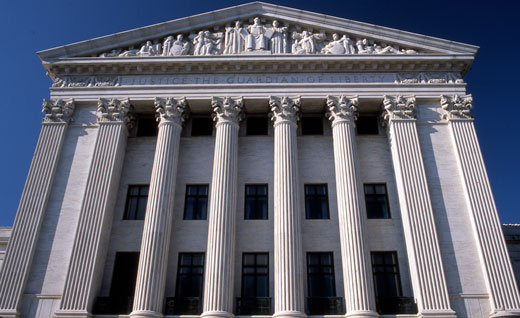
WASHINGTON – In certain circumstances, the state of Alabama says, it can fire or discipline a state worker who tells the truth – even if the truth exposes fraud and corruption. But that state “right” appears to fly right in the face of the U.S. Constitution and Supreme Court justices met it with reactions ranging from skepticism to incredulity.
At issue on Apr. 28 was a case by former state worker Edward Lane, who uncovered fraud – specifically a state legislator in a no-show job – in an Alabama community college program designed to help troubled youth. Lane testified to the fraud, first before a grand jury and then at two trials of the state rep. The rep was found guilty at the second trial.
Lane’s boss, college president Steve Franks, citing budget cuts, fired 29 “probationary” workers but later hired all but two back when he found they really were permanent, not probationary. Lane was one of the two left out of a job.
Lane took the case to court, claiming Franks retaliated against him, a government worker, for exercising his 1st Amendment rights to free speech. He lost in the lower courts, but he appeared to be winning the justices over.
The case is important not just for its specific circumstances, but because whistle-blowing government workers are often the best sources of information about waste, fraud and abuse. Leaving disciplinary power over them in the hands of their bosses when they speak up chills the prospect that they ever will. It also limits their rights of free speech.
When it comes to free speech and state and local government workers, though, the Supreme Court set some past limits. A worker testifying as a citizen has more rights when he or she does so, the court has said before. Same thing if the worker’s discussing “a matter of public concern.” But if the worker’s using info learned on the job, there are times where the state, exercising control over the workplace, can discipline or fire the worker.
The question is where to draw the line. Alabama said it can be drawn even if the worker tells the truth. The justices couldn’t believe what they heard. Justice Antonin Scalia was the most incredulous.
“Where did you get this view that the 1st Amendment can be applied only to protection of views and not to expression of facts?” he asked one of Alabama’s attorneys. He wasn’t alone.
“Let’s say he writes a letter to the editor. Can he be disciplined for that?” Chief Justice John Roberts asked. The Alabama attorneys’ answers to both questions was that, depending on the circumstances, yes.
The justices weren’t convinced. “We’ve said that government employees can take the knowledge” they gain about waste, fraud and abuse on the job “and go out and use it and be protected” from retaliation, Justice Elena Kagan pointed out. She got Franks’ Alabama attorney, Mark Waggoner, to agree. “Yes, that’s the heart of the 1st Amendment,” he said.
But not entirely, Waggoner added. “Factual testimony based only on knowledge (learned) due to official duties would not be protected,” he said. “It’s not the forum (used), but the character of the speech that counts. And if it’s not ‘citizen’ speech, you don’t get to the ‘public concern’ question.”
Tejinder Singh, Lane’s attorney, had a much easier time. “There’s a long line of precedents that holds the 1st Amendment applies to all matters of public speech” by public workers, except for a few internal memos, he said. “The principal point of contention is whether the fact that he learned about the facts” of the fraud while on the job “is sufficient protection” of the worker’s right to speak. Singh said it is.
So did the unions that filed friend-of-the-court briefs with the justices, all coming down in Lane’s corner. “Individuals who work for the government remain citizens entitled to participate in public affairs,” AFL-CIO General Counsel Lynn Rhinehart wrote in her brief. “And the public has a strong interest in hearing the views of public workers, who are often among the best-informed citizens regarding the workings of government.”
AFSCME, the Service Employees and the National Education Association urged the justices, in their brief, to go even further and protect almost all speech by public workers. The only exceptions, where a “balancing test” now exists, are speech “within the employer’s legitimate proprietary control” and speech that doesn’t involve a public concern. Waste, fraud and abuse, they said, is a public concern.
“Judged by those standards, a public employee’s truthful sworn testimony will almost always (their emphasis) merit protection against employer retaliation,” the three unions said. “That’s because truthful testimony necessarily implicates public concerns and a government employer has no legitimate reason for retaliating against an employee for such truthful testimony.”
The justices will announce a decision by the end of June.
Photo: The Supreme Court is considering whether the 1st Amendment protects Lane and millions of other public workers from job retaliation when they offer testimony about government misdeeds in court. Wikipedia (CC)












Comments